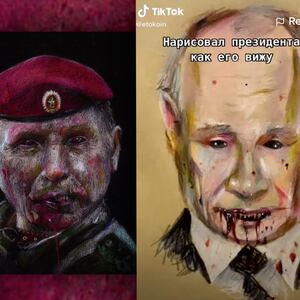ZOLOTE, Ukraine—This could be the most important week for Ukraine since Vladimir Putin ordered his troops into Crimea in 2014. We will finally discover how serious President Joe Biden is about defending the Ukrainians from Russian aggression.
Biden called to reassure Ukraine’s president that he would stand up for them before taking off for a whirlwind European tour that will take in summits with NATO, the European Union, the Group of 7, and finally a head-to-head with Putin himself. Ukraine will be high on the agenda at all of them, and Moscow and Kyiv will be listening closely.
The meetings will take place with Russian troops and military hardware looming over the border in eastern Ukraine. Earlier in the year, Putin even ordered what looked like an invasion force up to the border. He sent most of them away again, but they left key heavy military equipment in place—and the skirmishes on the border continue.
For many in Ukraine, the summit between Biden and Putin on June 16 has taken on a quasi-mythical quality. They fear it will be reminiscent of the Molotov-Ribbentrop Pact, in which Germany and the Soviet Union carved up Eastern Europe between them. “This is another meeting where the U.S. and Russia will divide the world between them,” said one alarmed Kyiv resident, Slava, 32. “I just hope that Ukraine will still be a free country.”
Concern on the street is matched in the corridors of power—the White House announced this week that Ukraine President Volodymyr Zelensky will fly over for post-game discussions next month—but more viscerally, the issue is felt keenly in eastern Ukraine, where The Daily Beast interviewed soldiers and civilians on the front lines of a conflict that has continued since Putin used confusion over the Maidan Revolution in 2014 to seize control of Crimea and send pro-Russian separatists into eastern Ukraine.
The recent escalation in war-torn Donbas is just the latest convulsion in a seven-year war that has claimed more than 13,000 lives.
A relatively calm period near the front ended at the start of the year with increased skirmishes that have continued into the summer. Peace talks are stalled between Ukraine, Russia, and the two Russian-backed republics in Donbas, which may explain why Russia sent as many as 100,000 troops to the border in April to pressure Ukraine and the West to accept Russian demands at the negotiating table.
“Putin’s Plan A is military and political pressure on the West and Ukraine. Plan B is a military operation in Donbas and, possibly, in the south of Ukraine (near Crimea),” said Vladimir Fesenko, chairman at the Penta Center for Applied Political Studies in Ukraine.
A military invasion would be catastrophic for Ukraine, which has been bombarded by constant threats from Moscow.
That’s why Ukraine continues to push for closer links to NATO. In the readout of the phone call with Biden, Kyiv claimed Biden had “highlighted” the need for a path to full NATO membership, but the U.S. later denied he had said any such thing and they were forced to issue a correction—although not before a furious Putin denounced the conversation. If Ukraine were ever allowed to join NATO, the organization’s Article 5 agreement means any military action against Ukraine would be considered a military act taken against each of the member nations, including the U.S.
Kyiv’s over-enthusiastic interpretation of the call shows exactly what they crave. They are desperate for Biden to convince Putin that the U.S. has got Ukraine’s back.
Biden will have the chance to tell Putin that directly. But Fesenko told The Daily Beast that the meeting between Biden and Putin is also a desperately needed chance to find some common ground that will allow for the peace negotiations to be kickstarted.
Fear on the Front Line

A Ukrainian soldier stands near the front line, looking toward territory controlled by the Russian-backed separatists.
Emil FiltenborgThe front line in Donbas is several hundred miles long, often cutting through cities and splitting families and friends apart. Soldiers are dug down in trenches near here in the small town of Zolote. One part of the city is under the control of Russian-backed separatists and cut off from the rest.
A few small explosions can be heard in the background—shelling is a part of everyday life here, highlighting the fragile peace between Ukraine and the separatists, which could reignite at any moment.
Igor Pershun, 46, a senior sergeant in the Ukrainian army, took us into a bunker along the front line, where four soldiers were asleep. He said the Russian-backed separatists were using weapons such as mortars, which are banned by a peace agreement.
During the heaviest fighting in the recent escalation in April, the Organization for Security and Co-operation in Europe recorded 1,424 ceasefire violations in four days, including the use of prohibited heavy weapons. The number was rarely higher than five daily violations before this year’s escalation, and both sides blame the other for the recent shootings.
When asked if he shoots back at the Russian-backed separatists when they shoot at him, Pershun said “it depends on the situation.” A press person made a hasty sign to him, and Pershun changed his answer.
“According to agreements, we don’t shoot in reply,” he said.
Oleg Bershov, 55, a soldier in the Ukrainian army, later claimed: “We don’t shoot at all [because] we are forbidden to shoot, so we just look, and are ready.”
With tens of thousands of Russian soldiers on the other side of the border it’s clear that Ukraine needs some backup.
Negotiations Stalled
Bershov is unsure what will happen next and says he doesn’t know whether the conflict will escalate into a full-blown war. He is certainly well aware that the peace negotiations occurring in both the so-called Minsk Protocol (consisting of representatives from Russia, Ukraine, and the two separatist republics) and the Normandy Format (with Ukraine, Russia, France, and Germany negotiating) have stalled.
Interventions from Europe—via France or Germany—have failed to make a breakthrough. Indeed, Germany has been busy working with Russia on the Nord Stream II pipeline, which will cut out Ukraine from a massive energy deal that sends Russian gas directly into Europe. Former President Trump also showed very little interest in resolving the standoff, he was more concerned with trying to use Ukraine as a tool to use against Biden.
The problem is primarily related to the previous Minsk agreement signed in 2015 that set up a kind of road map toward peace. The Ukrainian president, who was elected in 2019, has been arguing for changes, but the Russians have kept firm on their demands of “special status” for the separatist republics.
Alexei Jakubin, a senior politics lecturer at Kyiv Polytechnic Institute, told The Daily Beast that the two sides were miles apart. One problem is that Russia wants the separatist regions to get almost complete independence from Ukraine, while Ukraine will only allow autonomy to some local self-governing bodies.
Russia also wants to hold elections in the separatist regions to decide their future, while the separatists control the area. In contrast, Ukraine only wants these votes to be held after it regains control of the territory once again.
“The two sides do not trust each other. It is the first problem,” said Jakubin, “The second problem is that only peacekeeping negotiations are going on right now. There is no political dimension to them, so it is only about technical questions with no political horizon, and the result is that the process is frozen. It is a frustration for Russia.”
Biden—who will aim to cajole European leaders into taking firmer action—needs to create a burst of momentum to break the stalemate.
“Ukraine wants to rewrite the Minsk agreement to make it more sustainable, and Russia does not want this. They say that ‘we have the Minsk agreement, and you agreed, so let’s do that,’” says Jakubin. He fears for the future if a deal is not struck soon.
Frustration
The deadlock creates an incredibly dangerous situation because the seven-year-long war has been costly for Russia as well as Ukraine, and Putin may suddenly demand an urgent solution—even if that includes military escalation. The meeting between Biden and Putin offers a possible chance to avoid war, but Jakubin is fearful that it may not succeed.
While the talking goes on this week, civilians continue to live in dire conditions near the front line with the destruction of property, lack of investments, and the closure of many workplaces.
Sergii Khrapatch, who is running a small hotel in the mining city of Toretsk, around three miles from the front line, told The Daily Beast that life here was getting “worse and worse and worse and worse” all the time. He had to rent out several hotel rooms to small businesses just to make a living. Instead of guests, keys are now being copied in his hotel next to a laptop repair shop. Like many others, he fears that the local coal mine, the biggest employer in the city, will close and leave people without work.
The Daily Beast also met a woman in a town named Avdiivka, which experiences frequent shelling. She did not want to give her name for security reasons but explained that they do not even have clean drinking water. She fears that Russia will attack and finish “what it started.”
“What are we supposed to do here? There is nothing here,” she said. “They shoot all the time. We need help.”

Several buildings near the front line are deserted due to shelling. However, it is not only the war that makes people leave. It is also the closure of factories and mines.
Emil FiltenborgSome people direct their frustration toward their own government, while others blame the Russian-backed separatists and Moscow.
“The people near the front line have lived through a remarkable level of violence and uncertainty but have somehow managed to keep afloat,” said Brian Milakovsky, a human-rights worker who has lived and worked near the front in Ukraine for several years. “The shelling plays a role in the suffering, but it is more complex, and some locals are asking themselves who is at fault for their human and economic suffering.”
Biden vs. Putin
Russian presidential spokesman Dmitry Peskov recently said that Putin’s only engagement on Ukraine at the meeting with Biden would be trotting out the Russian spin on the conflict. Biden will need to draw on all his experience from the hours he has spent with Putin in the past to get beyond the talking points and make real progress.
“You know that President Putin is well versed on this issue, and if needed, he will be ready to provide all clarifications on Russia’s position,” said Peskov, according to Tass.
Fesenko says that Putin does hope the meeting will create a path toward a peace deal—so long as it’s on his terms.
“A new ceasefire is possible in Donbas, but there may also be some bursts of targeted military operations. The likelihood of the implementation of the Minsk agreements remains extremely low,” said Fesenko, “The maximum that is possible is a stable ceasefire of all hostilities while maintaining the current political structure. This means freezing the conflict.”
In Jakubin’s opinion, both Russia and Ukraine managed to use the recent escalation to their benefit. Russia secured a meeting with Biden and a kickstart of negotiations, while Ukraine managed to get its struggle on the American and European agenda again.
“In that sense, I think both sides reached their aims right now,” said Jakubin. “What the future will bring, however, depends on how fruitful the talks between Biden and Putin will be and if the meeting between Zelensky and Putin takes place. However, even though those meetings might go well, I still believe that the best scenario is just stopping the current fighting. Peace seems hard, so it is more likely that it will be a frozen conflict.”
Anna Foya, 22, who studies medicine in Kyiv, said she would be gripped by the showdown between Biden and Putin. She fears “Putin can influence Biden in some way at the meeting.”
“We just want peace,” she said. “That is all we want.”
Vengeance
For the Ukrainian soldiers stationed near the front line in Zolote, there is deep concern about the next stage of this conflict.
One soldier said he was frustrated about the Russian-backed separatists’ use of banned weapons and snipers, creating a constant danger.
“They are very aggressive towards us,” said Anton Pisarenko, 30, a sergeant in the Ukrainian army. “They think that they are a separate government and that we owe them something. That we should give them something, and that is not true.”

A Ukrainian soldier shows a machine gun near the front line in Zolote.
Emil FiltenborgSeveral soldiers told The Daily Beast that they see similarities between the current leadership in Russia and the Soviet Union. One of them was Sergeant Andrey Yarmoluk, who said that he will not forgive Russia for what it has done to his country. He feels that Russia today has no respect for Ukraine’s independence and regards it as a part of Russia. The intensity of the feeling on this side of the border shows how difficult it will be for the two sides to come to an agreement.
“They came to my home, and I will not forgive them for that. I will throw them out. I will push them as far as I have strength,” said Yarmoluk. “When the war started in 2014, I promised myself that I would get to the Kremlin and scratch with a fork on the wall that I was there. I will do this. It is my promise. I will do this.”



